What to Look for in a Goldendoodle Puppy?
Once you’ve made the decision you would like to be a Goldendoodle owner, you’ll have to dedicate time and effort to find the best puppy for you, which is no small task. Many different factors go into researching and vetting Goldendoodle puppies.
We will go over what to look for in a Goldendoodle puppy to prepare you for your journey to becoming a satisfied pet owner.

Preparing to Buy a Goldendoodle Puppy
Before choosing your new puppy and bringing him or her home, you should first get to know the breeder. The breeder’s expertise, experience, and treatment protocol for puppies and their parents say a lot about the genetic and social quality of the Goldendoodle puppy you will bring home.
(Check out our where to buy a Goldendoodle guide)
Get to Know the Breeder
Just as a breeder should screen potential owners, you should also make sure that you’ve found a conscientious and professional breeder who knows a lot about Goldendoodles and the parent dogs’ medical histories and personalities.
You should ensure that the breeders you deal with perform genetic and physical testing on the parent dogs to ensure that their offspring aren’t predisposed to suffer from common conditions that plague the breed. You should ask your breeder if they have done OFA and CERF testing.
You will also want a breeder who introduces you to the parent dogs. Parent dogs give you a glimpse of what your Goldendoodle puppy will grow into both physically and socially. Parent dogs must be at least three years old, and the puppies must be with their mother for at least two months so they can develop and benefit from their mother’s milk.
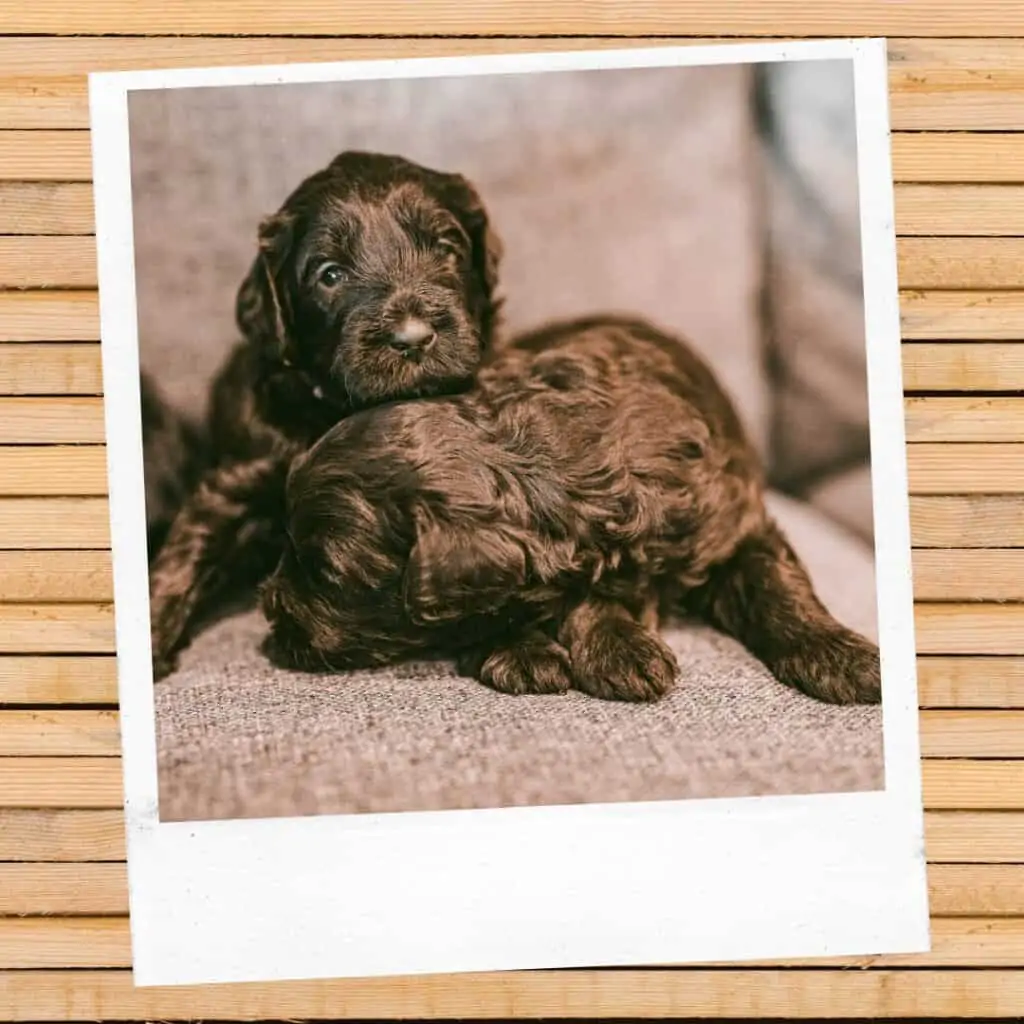
Depending on how long the puppies stay with the breeder, they might have already given them their first round of vaccinations and dewormed them.
Good breeders also provide a comfortable and spacious area for the parent dogs and puppies, which you should observe upon arrival to their home and grounds. Dirty or cramped quarters or other adverse conditions may cause traumas that will surface later in the developmental process.
To ease the process of bonding and proper nourishment when you bring your Goldendoodle puppy home, breeders should supply you with all the information you need to make the transition as smooth as possible. You should ensure that breeders are forthcoming and knowledgeable on best-care tips and habits. Here are a few suggestions on what to ask the breeder:
We recommend you get your breeder’s contact information to follow up with them on any additional questions and concerns you may have forgotten to ask on-site. Puppies, like all animals, are a product of genetics and their environment, so a loving and caring breeder is an excellent indication that your Goldendoodle will likewise be loving, healthy, and happy.
What size Goldendoodle are you after?
The size difference between a Mini Goldendoodle and a Standard Goldendoodle can be staggering. [The smallest Goldendoodles are Teacup and Toy Goldendoodles].
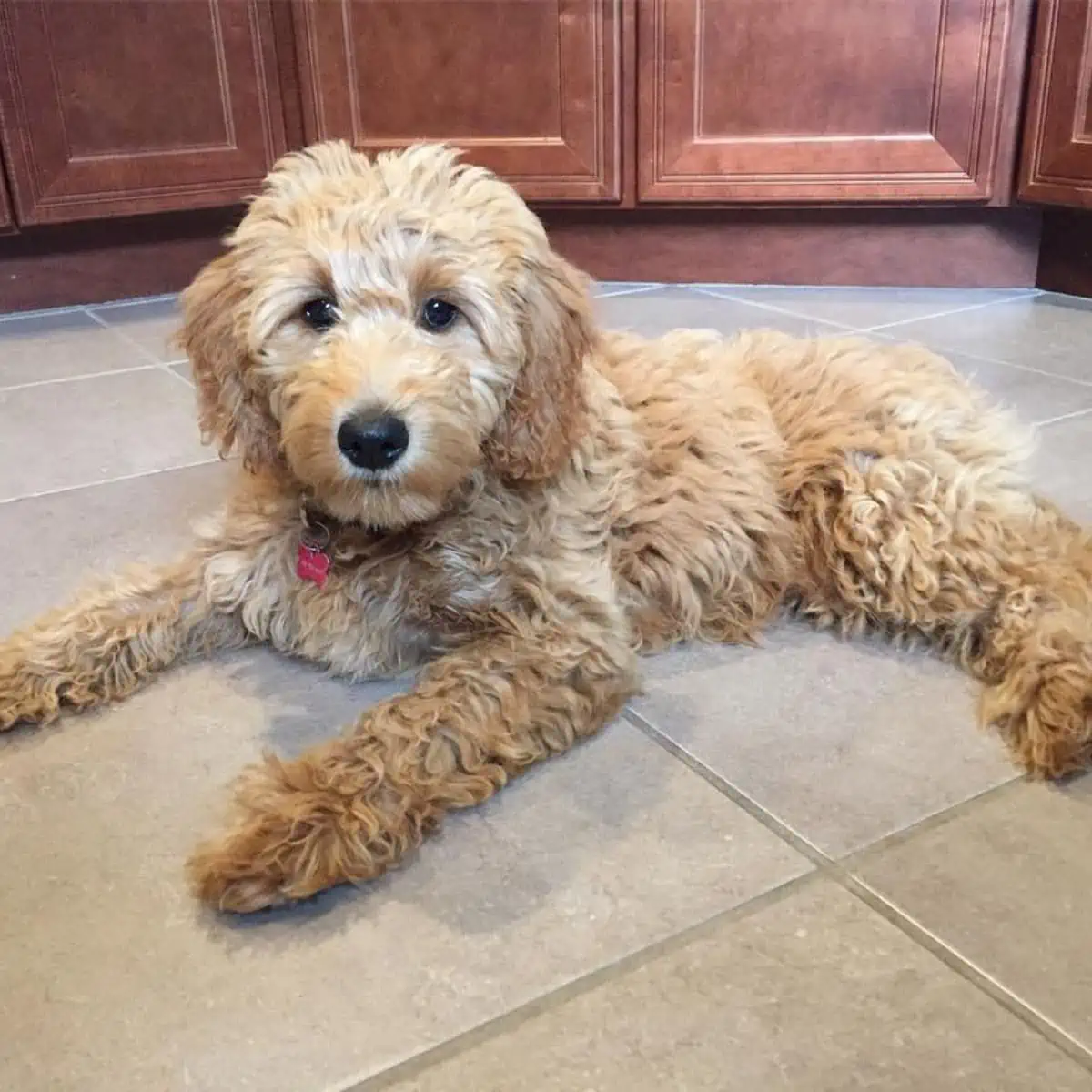
If you need to pick up your dog to put them in the car or bath them – you do NOT want a standard or medium Goldendoodle! They will be far too heavy for the average pet parent.
Ask to see the statistics of the parent dogs. Check the weight and height and find the average between. This is a best estimate if these parents do not have any previous litters to compare to.
What generation of Godlendoodle are you after?
The difference between a F1 Goldendoodle and a F1b Goldendoodle can be huge.
Go in depth and learn about the different generations of Goldendoodle dog and the differences in this guide. We also have a predicitive guide on how to tell what type of Goldendoodle coat your puppy will have (curly, wavy, or straight).
Find a Primary Veterinarian
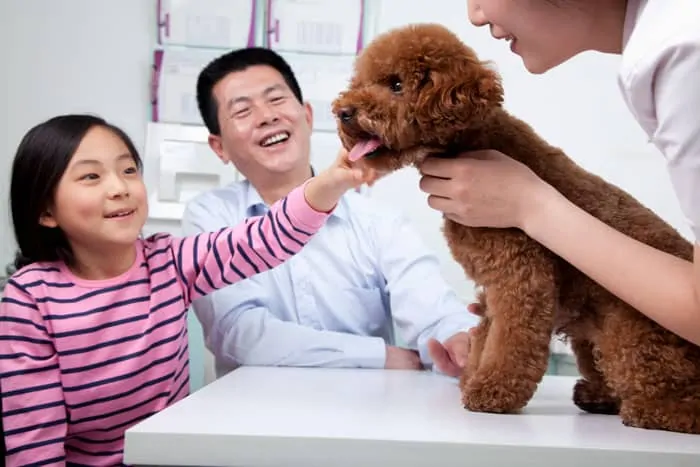
One of the first duties you have once you’ve brought your new Goldendoodle puppy home is to take them to the veterinarian, so you should be proactive and find a reputable vet close to your home. You should bring the breeder’s health certificate with you so the vet can compare the examination with the parent dogs’ medical history.
The veterinarian will perform a thorough check-up on your puppy’s vitals and physicality to rule out any health problems that might not be apparent to your average pet owner.
Your puppy’s first check-up will consist of the following procedures:
- Eye and ear exam
- Teeth, mouth, and gums check
- Listening to the puppy’s heart to rule out the presence of heart murmurs
- Feeling the torso for protrusions indicative of hernias
- Examination of the coat and skin for fleas and ticks
- Examination of a stool sample for worms
The vet will also vaccinate your puppy if necessary and prescribe specific deworming medicines if they detect any heartworms, intestinal worms, or skin parasites. Just as you asked the breeders feeding and sleeping schedules, your vet will have even more information on training, nutrition, and other areas of pet care.
What to Look for in a Goldendoodle Puppy
You want your Goldendoodle puppy to have the best life possible with you and your family, so there are various variables that you should investigate and anticipate in your search for the best Goldendoodle puppy. We will go over the most important factors to look for in a Goldendoodle puppy in the following sections.
Physical Health and Genetic Predispositions
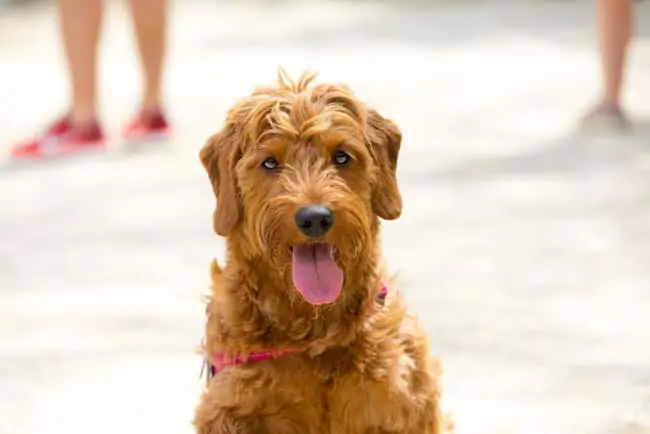
Upon consulting with a breeder, they should supply you with the puppy’s parents’ medical history. Medical records will show if either parent dog has suffered from conditions or diseases that may be genetically inheritable.
Breeders usually do genetic screening for genetic diseases or conditions common to poodles and golden retrievers. Ostensibly, if breeders present you with health certificates for the parent dogs, this means that they do not have any severe genetic conditions.
If you notice any genetic conditions the parent dogs have suffered in their lifetime, this indicates that their puppies are more likely to exhibit similar ailments. These are the most common issues that Goldendoodles face, for which you should do an independent screening with your primary vet:
- Hip Dysplasia
- Elbow Dysplasia
- Dilated Cardiomyopathy
- Progressive Retinal Atrophy
What is Hip Dysplasia?
Hip dysplasia is a painful condition caused by the malformation of the ball and socket joint that attaches the femur to the hip bone. Both Poodles and Golden Retrievers are prone to hip dysplasia, and while it is not deadly, it causes arthritis and immense pain. It also ends up affecting the way dogs walk, which causes other skeletal and orthopedic conditions that end up costing a lot to treat.
What is Elbow Dysplasia?
Elbow Dysplasia also results from the malformation of the elbow joint due to extra cartilage growth in the elbow socket causing instability and the tendency for joint displacement. Malformation in the elbow leads to pain caused by arthritis and inflammation. Dogs will begin to hobble, limp, or simply walk on three legs to avoid the pain.
What is Dilated Cardiomyopathy?
This is a heart condition that is common in both Poodle and Golden Retriever breeds wherein the heart’s ventricles expand, causing the heart to overexert itself when pumping blood. This is a lethal condition, but there is treatment available.
What is Progressive Retinal Atrophy?
Common to Poodles, this is a degenerative eye disease in which the retina slowly declines, resulting in blindness. There is no cure and no treatment.
Goldendoodle Breeding
As you’re well aware, Goldendoodles are a designer dog hybrid between a Golden Retriever and a Poodle. Since this is a relatively new “designer breed,” breeders often still use purebred Golden Retriever and Poodle parents. However, there are three primary mating conditions that breeders use to select for Goldendoodle puppies:
- First-Generation Goldendoodles, 50/50: Goldendoodles whose parents are a pure-bred Golden Retriever and a pure-bred Poodle, resulting in an even 50/50 gene contribution from both parent breeds. These are the most sought-after puppies as they have long, curly coats and teddy bear faces.
- Second Generation Goldendoodles, 25/75: These puppies come from an FI Goldendoodle bred with a pure-bred Poodle. The result is thus a 25/75 Golden Retriever to Poodle genetic material ratio. F1B puppies shed less, with coats that resemble Poodles.
- Multi-Generation Goldendoodles,: Goldendoodles whose parents are both Goldendoodles. They shed more and generally have more Golden Retriever traits.
Size and Coat Color
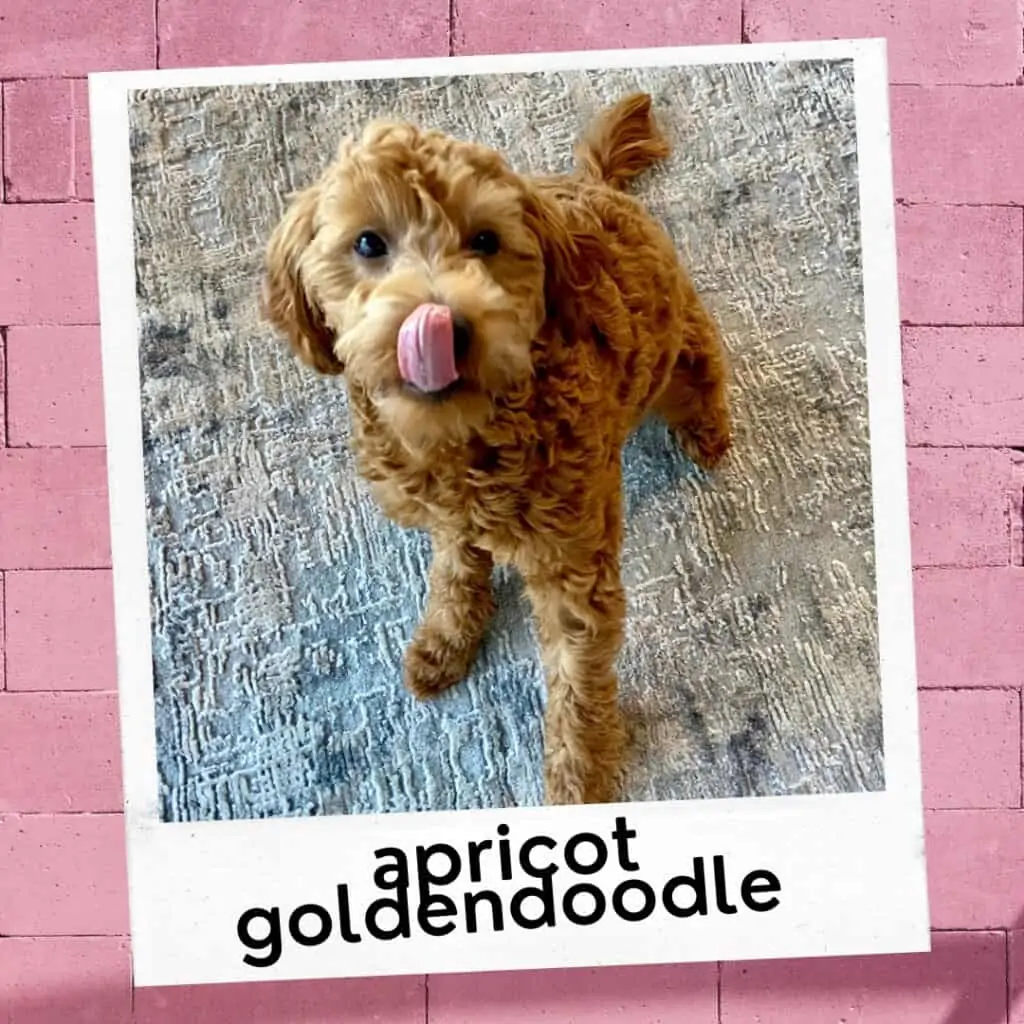
Goldendoodles come in different sizes and colors according to their breeding make-up. Since Golden Retrievers are uniformly large dogs, the size of your Goldendoodle puppy depends more on the Poodle’s contribution to the genetic pool.
Poodles can be toy, miniature, or standard, ranging in size from 3-70 lbs. If you want a small Goldendoodle, make sure the poodle parent is a toy or a miniature Poodle.
Goldendoodles have various coat colors and hair types, and while this is purely aesthetic, we know everyone has their preferences for the way they want their Goldendoodles to look. Again, you will need to look at the parents’ coloring, but often litters will have numerous different coat colors.
Sociability: Does the Puppy Get Along with Humans and Other Animals?
You will have to spend some time playing with the Goldendoodle puppy at the breeder’s home as well as meeting the puppy’s parents to gauge the puppy’s sociability. Everyone wants an affectionate, docile, and energetic dog, and to some extent, that depends on how much training and attention you provide your puppy as they develop.

There are a few things to look for when looking for a puppy that will give you a better idea of how social or antisocial he will be with humans and other dogs. You should observe how the puppy interacts with his brothers and sisters. Is he playful? Does he fight with them?
Is he indifferent? A puppy who actively participates in play with other puppies is most likely going to get along with other dogs. We recommend that if you have another dog in your home, bring your dog along so you can observe how they act around each other.
You also must interact with the puppy you are considering purchasing. If the puppy is receptive to your caresses or enthusiastically approaches you, then that is a good sign that the puppy will bond easily with humans.
If you have children, you should bring them along as well to see how the puppy reacts to a child’s energy. Puppies that run away from you or nip at your fingers if you try to hold them might not be the most affectionate dogs when they get older.
Conclusion
By following our suggestions on what to look for in a Goldendoodle puppy, you’ll have the knowledge and foresight necessary to choose your new best friend (from a reputable breeder or via adoption – never a puppy mill).